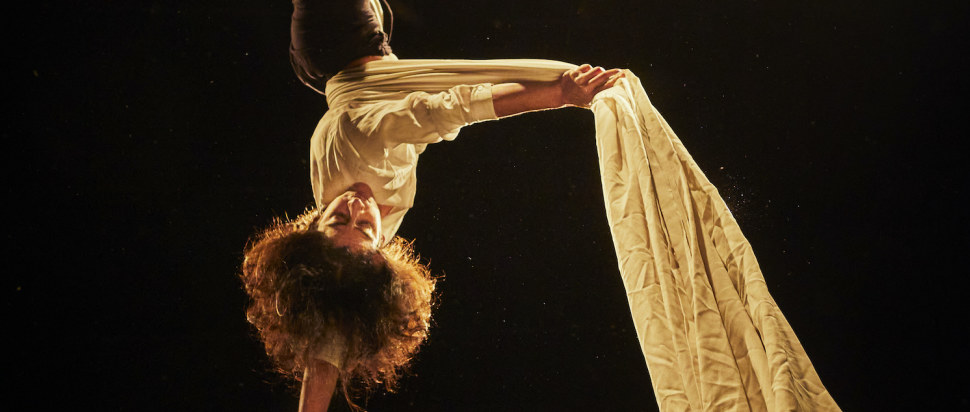Palestine Centre Stage: Palestinian Theatre at the Fringe
We speak with some of the artists bringing Palestinian theatre to this year’s Fringe
While spending recent months attending protests, emailing MPs or donating funds, many have inevitably looked to the arts amid the ongoing genocide in Palestine – whether to learn, support or hope. At this year’s Fringe, theatre speaking to and from Palestine offers much-needed time and space to bring our solidarity to the stage door and beyond.
Over at Summerhall, Jerusalemite artist Ashtar Muallem brings Cosmos, a piece which combines dance and physical theatre to explore seeking and finding spirituality amid life’s complexities. With humour and grace, Muallem presents a balancing act between her life lived in Palestine and in France. “What sets me apart as an artist is my awareness of these influences; I am continuously reflecting on my existence and expanding my understanding,” Muallem says. “My art reflects who I am at any given moment, moulded by these experiences.” Drawing on her memories of her grandmother, Muallem centres her connection with her own heritage in the present moment, allowing it to reach, bend, or curve in times to come.
Similarly looking to her past, Amena Shehab is a Palestinian-Syrian-Canadian actor, playwright and community leader, soon to perform the eponymous role in Hagar: War Mother at theSpace. The play follows a mother attempting to escape Syria with her infant son, seeing her tried and tested at every obstacle. For Shehab, stepping into the role of Hagar has not been easy, given her own similar experiences. “It is a challenging role to perform, because it is hard to leave it at the stage door. I was born a refugee in a Palestinian camp in Damascus, and then found safety from the Syrian war in Canada,” she says. Bringing the show to the Fringe for the first time, Shehab is nervous about performing and fears Hagar’s narrative may be lost amid the scale and noise of the festival. “But I truly believe art can change the world. It’s the way I make sense of things that otherwise I do not know how to express. It is my way of taking action and of taking power and of finding a way through the darkest of times.”
Starring Khawla Ibraheem and directed by Obie Award-winner Oliver Butler, solo show A Knock on the Roof sees Gaza-based Mariam ‘practice’ evacuating her home ahead of Israeli demolition. With only 12 shows at the Traverse this August, the show will be heading to Broadway in January 2025 for a much-anticipated run. “With this piece, I am inviting the audience to simply exist in the same space as Mariam and embrace the complexities and contradictions that all of us face in our own lives as she navigates the banality, frustration, and humour of making thousands of decisions as war approaches,” says Ibraheem. “And I believe this can inspire a personal relevance for the audience that will outlast the current headlines in the news.”
Amid Western news reporting, the personhood of Palestinians is cruelly sidelined in an intentional and violent act of neglect. Through theatre, we can attempt to reflect upon refugees’ lives in their entirety, rather than solely via the lens of their oppression. As Shehab notes, “in the play Hagar becomes a refugee, but before that she is a woman and a mother, so I hope this play appeals to a wide audience. Her strength is inspiring.”
A Knock on the Roof similarly centres the personal. “To me, solidarity and protest deal with the spontaneous temporary reactions of a large collective in support of a cause or community,” says Ibraheem. Rather, she’s keen to take a closer look. “I approach my work from the opposite direction – rather than writing in response to or in conversation with a political or social movement, my artistic impulse is to capture the individual human level.”
Theatre inevitably has its limits. “I'm sceptical of the power of theatre to effect social or political change; a play won't stop the ongoing war on Gaza, for example,” says Ibraheem. With an international stage comes an international audience, and as such, the Fringe is no mean feat to navigate. “But I do think that inviting an audience from different backgrounds to spend real time laughing, crying and even breathing together at the same moments while listening to a story of a person they never met (and who exists hypothetically in their imagination), can create affinity.” For Ibraheem, politics may not bring total unity, but connecting through theatre and its comedy is possible, “Because we all know what it takes to convince a six-year-old to take a bath.”
As Muallem notes: "We are like dough or material, shaped by the life experiences we endure and the challenges we encounter.” And art, too, shapes us – if we allow it. This August presents an opportunity to give our attention to Palestine, its diaspora, and their theatre, carrying their stories with us.
Cosmos, Summerhall, 1-11 Aug, 9.15pm, £10-17
Hagar: War Mother, theSpace on the Mile, 2-10 Aug, 2.20pm, £8-10
A Knock on the Roof, Traverse Theatre, 13-25 Aug, various times, £5-22.75
